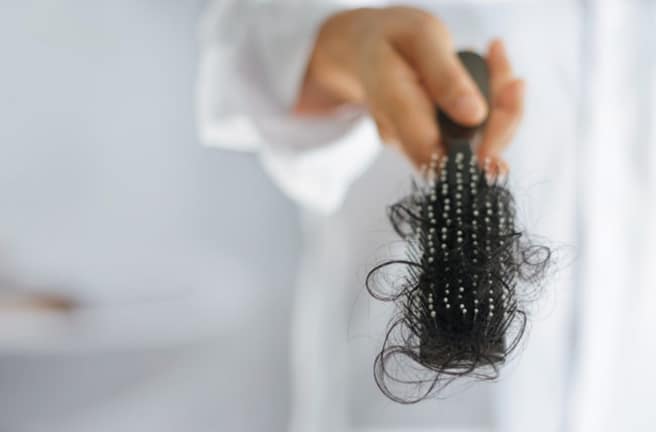You might’ve heard by now of the phrase “Long Haulers” which simply put, are people who are experiencing long term complications as a result of having had COVID-19. Among the many long term issues people are experiencing is hair loss. There is not yet any definitive information out yet about the cause of hair loss being related to the coronavirus yet there are large numbers of people who are reporting a significant amount of hair loss after having C-19. Often, this symptom does not present right away. It presents in about two to three months after having the virus. It isn’t evident right after being sick because of the growth phases of the hair growth cycle.
The Hair Growth Cycle
For most people, this condition will improve once the hair growth cycle catches up. Here are three phases to this cycle.
1) The growth phase is called anagen. This is where your hair is growing normally.
2) The resting phase is called catagen. In this phase, your hair doesn’t grow in length but it remains in place. You won’t recognize it as not growing because each follicle is on its own schedule.
3) The final phase is the shedding phase or telogen phase. An estimated 10 to 15 percent of your scalp hairs are in this phase. Hair doesn’t grow during the telogen phase. At the end of this 3- to 4-month phase, some of your hair falls out. Losing up to 100 hairs a day is normal. When a hair falls out, a new hair is grown in the same hair follicle, and the growing cycle begins again. Most of the time, about 90 percent of your hair strands are in the growth stage at any given time. About 5 percent are in each of the other phases. That is why you may not notice what is happening. However, when a sudden change in the body occurs that shocks the system, which results in telogen effluvium.
Let’s Talk About Telogen Effluvium!
WHAT IS THAT? It’s the technical term for a form of hair loss that usually happens after stress, a shock, or a traumatic event. Doctors believe this is what’s happening. It comes from the result of an abnormal shift in the hair growth cycle and is not a new condition. We are only recently hearing this phrase because of Covid.
Your body experiences significant shock after an illness like COVID-19. In addition to C-19, here are some other reasons that your hair can go into TE:
- Childbirth: postpartum hair loss. This can resolve after a few months or transition into female pattern alopecia.
- Physiological neonatal hair loss
- Acute or chronic illness, especially if there is fever
- Surgical operation
- Accident
- Psychological stress
- Weight loss, unusual diet, or nutritional deficiency (iron deficiency/)
- Certain medications
- Endocrine disorders (hypothyroidism, hyperthyroidism)
- Discontinuing the contraceptive pill
- Overseas travel resulting in jetlag
- Skin disease affecting the scalp (erythroderma)
- Excessive sun exposure.
If you had COVID-19 and you are experiencing hair loss, let your doctor know. As noted, we do not know what the long term implications of this virus are, (long haulers) but based on the understanding of the growth phase and the fact that the hair follicles are not damaged during this process, it is safe to say most people will see their hair begin to regrow again. You may need to simply wait until your body heals and gets caught up with the hair loss it has experienced. It’s often temporary but it can also be permanent.
There are treatments that can slow down the shedding process so please feel free to contact the Hair Specialists at Graff Hair Technology to learn more.


